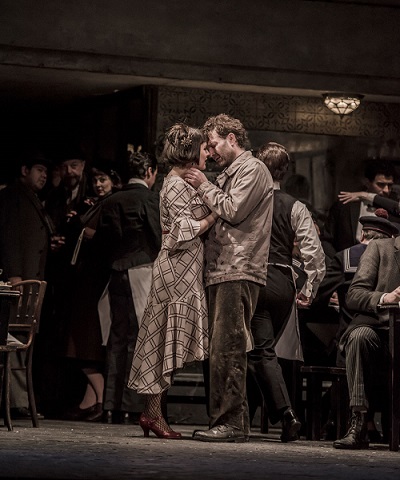This was, I think, the fourth time I have seen Jonathan Miller’s production of La bohème. It strikes me, in this revival directed by Crispin Lord, to have a good deal of life in it left. Indeed, previous reservations have largely vanished. It is not a complex piece of theatre, nor does it lead one especially to reassess the piece, but it enables an intelligent retelling, far from dependent on the participation of particular artists and frames that retelling in unshowy yet arresting 1930s style. It is recognisably Paris, recognisably ‘Bohemia’, and again offers space, if far from a blank canvas, to enable artists to create them and make them their own. It has a definite photographic-cinematic look too, and a similar propulsion to the action, all suiting and shaping Puccini’s timing, concision, and ‘cuts’, without making that into a theme in itself. Where I initially found elements of comedy jarring, now they seemed to me very much part of a greater tragicomic vision, like night and day, or life and death. The ‘extra’ elements observed, whether general city toing and froing or, in the fourth act, Musetta arriving downstairs with Mimì, struggling to get her upstairs, genuinely added to the drama rather than distracting from it.
Perhaps I had previously been too much of a curmudgeon, or perhaps the distance afforded by a revival director and lively cast make all the difference. Perhaps, even, the pandemic has played its part in permitting all of us to appreciate what we have, rather than longing for what we have never had. At any rate, it works well and spares us the inevitable ‘coronavirus production’ around the corner. The one I truly dread is the Tristan ‘Brangäne, you’re on mute’ staging: ‘I only wanted to stage this opera when Tristan und Isolde could be shown as radically distanced from each other, never truly on-screen at the same time. Video conferencing gave me the tools to pursue that vision.’ But I digress: back to Puccini.

Or maybe not, for one of the most impressive aspects was Ben Glassberg’s conducting, which revelled in Puccini’s Wagnerisms, memories of Tristan evoked quite magically in the first act, without taking for something they were not. The sounds extracted from the ENO Orchestra were often magnificent: a great dynamic range, from moments of hushed intimacy, to grand, declamatory gesture. But it was Glassberg’s pacing and his reconciliation of vocal and orchestral demands that marked this out most strongly. That was not all his doing, of course. Both orchestra and chorus—what a joy to see and hear a chorus, handled most resourcefully, onstage once again—deserved plaudits in their own right. String sheen and incisiveness, bubbling woodwind and chorus: these and more played their part in weaving an effervescent, yet ever-darkening dramatic tapestry.
So too, naturally, did the singers. Sinéad Campbell-Wallace gave a touching performance as Mimì, finely acted as well as sung, with a generosity of spirit that took us far beyond any perils of sentimentality. Louise Alder was an outstanding Musetta, as charismatic as one could wish for in vocal as well as stage presence, with a sharply drawn character that avoided all suspicion of caricature and yet suggested uncommon depth, worn lightly. Charles Rice offered a similarly charismatic Marcello, swaggering, ardent, yet not without vulnerability. David Junghoon Kim was alas unable to sing Rodolfo, though continued to act it, Adam Gilbert making an excellent replacement from the wings. Benson Wilson and William Thomas gave thoughtfully drawn etched portrayals of Schaunard and Colline respectively, the latter’s Coat Aria a tiny gem in itself. Simon Butteriss well-nigh stole the show with turns as Benoît and Alcindoro. Some may not have cared for his—and other—spoken interventions, but for me they seemed much in keeping with the general sense of musico-theatrical company. That, surely, is a post-pandemic prize ENO would do well to win back. On this evidence, at least, it is a good way there already.
Mark Berry
Giacomo Puccini, La bohème
Marcello – Charles Rice, Rodolfo – Adam Gilbert, David Junghoom Kim, Colline – William Thomas, Schaunard – Benson Wilson, Benoît/Alcindoro – Simon Butteriss, Mimì – Sinéad Campbell-Wallace, Parpignol – Adam Sullivan, Musetta – Louise Alder. Policeman – Paul Sheehan. Official – Andrew Tinkler; Director – Jonathan Miller, Conductor – Ben Glassberg, Designs – Isabella Bywater, Lighting – Jean Kalman, Martin Doone, Chorus and Orchestra of the English National Opera (Mark Biggins, chorus director).
Coliseum, London; Saturday 5th February 2022.
ABOVE: Sinead Campbell Wallace © Genevieve Girling